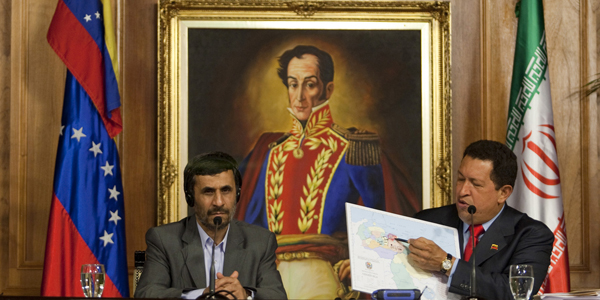Iran's Failed Latin America Outreach
With Hugo Chavez faltering, the Islamic Republic is looking for new friends in the region
With Hugo Chavez faltering, the Islamic Republic is looking for new friends in the region
If Iran's leaders aren't concerned about Venezuelan leader Hugo Chavez's cancer, they should be.
One look at Chavez is all it takes to see that he is not the same man as before his recently revealed illness. In addition to his own domestic and regional problems, he now has a very serious health issue to deal with. During and after his treatment, when he has the strength to work, he will probably want to spend most of his time dealing with domestic issues, which are the priority for him. His alliance with Iran, a foreign policy lynchpin for both nations, could move further down his priority list.
It's unclear to what extent Vice President Elias Jaua and Finance Minister Jorge Giordani, who have been delegated with parts of Chavez's authority, would uphold the alliance. In fact no one is quite sure how popular Iran is with his cabinet. All we know is that Chavez is the biggest champion.
The recent U.S. sanctions imposed against Venezuelan oil company PDVSA, punishment for its dealings with Iran, will also complicate the alliance. This is another factor that could reduce the motivation of Venezuelan politicians for maintaining their increasingly costly relationship with Iran.
After Chavez's illness, the Iranian government might itself wish to consider whether, when it comes to Latin America, putting all their eggs in one Venezuelan basket was a wise move.
Though Iran has close political relations with the governments of Ecuador, Bolivia, and Nicaragua, their bridge, champion, and biggest lobbyist in all these countries has been Hugo Chavez. If it weren't for him, many of them might have already reduced their relations with the Islamic Republic.
Iranian diplomats love a good chat, and are excellent at praising and signing agreements. But when it comes to delivering on those agreements, their performance has been not been so good, to say the least. Little in the way of pledged foreign aid, for example, ever manages to come through.
Nicaragua, which once looked to be a new close Iranian ally, provides a good example. After all the hype over Iran's supposed plans for a massive embassy in Managua, very little actually happened. Iran's embassy in Mangua is still small, much like its aid and presence.
It's not just the Nicaraguans who have a right to be disappointed. Iranians too, especially those who are against Iran's current foreign policy in Latin America. Nicaragua is a lightweight in global politics and economics, giving Iran little in return for its patronage. For years, the Ortega government has shrugged off Iran's demand to repay its $164 million debt to Iran, which his government accumulated in 1986.
Chavez's illness, and the possibility that other Latin American countries could start questioning their relations with Iran, could help explain why the Iranian foreign Minister recently offered "constructive" dialogue with the Argentinean government. The proposed subject of the talks would be the 1994 bombing of a Buenos Aires Jewish community center, allegedly with Iranian involvement. The incident has been a major obstacle between the two nations.
Iran may be hoping that by building better relations with Argentina it might be able to diversify its Latin American relations away from Venezuela.
Iran is also hoping that this new move will improve its badly tarnished image on terrorism. The country also hosted its own anti-terror conference in Tehran in late June.
The government of Argentina's response to this outreach was perhaps cooler than Iran had hoped. "If the Iranians wanted to cooperate, what they needed to do was to turn over to the Argentine authorities those accused of the attack", stated former Argentine prosecutor Alberto Nisman, who had investigated the case and accused Iran of being behind the attack.
In terms of the potential and probability to improve relations with Argentina, Iran's questionable performance in delivering on promises to Latin American countries is likely to push the Argentineans away from Iran.
If Iran's poor record doesn't push Argentina away, its reference to the bombing investigations as "misguided" probably will. That this is an election year in Argentina makes this matter even more sensitive.
Argentina, or any other Latin American nation considering cozying up to Iran, would also risk a severe backlash from the U.S., a major economic and political power in the region.
For now, the best Iran can hope for in Latin America is a sudden and complete improvement in Chavez's health and his return to full office. For the sake of their Latin American policy and outreach, Iranian leaders should pray that this will be the case. Otherwise, Iran could find its influence in Latin America sink to new lows, perhaps within as little as two years, if not earlier.
